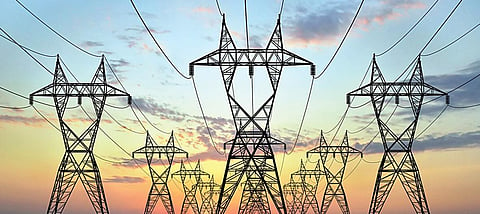

CHENNAI: India’s electricity distribution sector is in tatters. Its total debt is estimated to have breached the Rs 5 lakh-crore mark in FY20 and is expected to cross Rs 6 lakh crore in the current financial year, while high aggregate technical & commercial losses (AT&C) — basically unpaid bills and power theft-have only served to pile on to the misery.
Industry executives and analysts have long opined that sweeping structural reforms were needed to revitalise the sector. The Union government’s proposed Electricity (Amendment) Bill, listed for the current monsoon session of Parliament, tries to do the same.
The reforms laid down in the Bill include changes in tariff-setting and subsidy delivery systems. Many of these are structural changes - such as changes proposed in the regulatory structure. But the one to have maximum impact on end-consumers is the introduction of the Direct Benefit Transfer (DBT) system for power subsidies.
Under the proposed system, consumers will have to pay the unsubsidised bill to discoms and state governments are required to pay subsidies directly to the consumer. At present, states provide a wide range of subsidies to consumers, almost all of which fall in the agricultural and below poverty line (BPL) segments. End-consumer tariffs are decided by state commissions after accounting for subsidies offered by the respective state, which means that the beneficiary of a free power scheme has to pay nil out of his own pocket.
Debilitating burden
The present system may be advantageous to consumers, but has been rather destructive for discoms. Because while the Electricity Act 2003 stipulates that state governments have to pay subsidies to discoms in advance, delayed payments are among the biggest financial burdens for the sector.
The International Institute for Sustainable Development (IISD) and Council on Energy, Environment and Water (CEEW) in a recent report noted that “in every year from FY16 to FY19, at least seven subsidising states and UTs had not paid discoms all transfers for subsidies by the end of the financial year”.
The current regulations provide for measures to prevent such delays, but are often ignored in practice. For instance, the report notes that not only are state governments supposed to pay discoms in advance, in case of delays, “discoms are to levy the tariff rates from the initial tariff schedule that does not consider the subsidy amount”.
Another problem for discoms is the lack of proper subsidy targeting in the current system, leading to generally inflated subsidy costs. “A lack of effective targeting, coupled with no upper-limit for subsidized consumption, could be disastrous for discom finances,” the IISD-CEEW report added.
The move to a Direct Benefit Transfer (DBT) system is aimed at addressing both these problems-inflated subsidy costs due to poor targeting and the financial impact of subsidy payment delays by state governments.
Implementation challenges
The myriad socio-economic complexities of India’s subsidy system would make rolling out the DBT system a very difficult task. The lack of proper information on subsidy beneficiaries, which works to inflate subsidy payouts, will also make it difficult to route subsidies to the truly eligible.
The Center for Study of Science, Technology and Policy (CSTEP) recommends certain pre-requisites such as validating authorised and unauthorised IP connections; awareness programmes for farmers on the benefits of metering; and state subsidy for installing meters.
According to IISD-CEEW, at an aggregate level, agriculture consumers were allotted 75% of the total subsidy value, but such connections are unmetered in most states. The proposed shift to DBT has also raised fears among consumers that their power costs will soar if the state governments fail to deposit subsidies on time. This led Union power minister R K Singh to clarify after the draft was released last year that the electricity supply will not be discontinued even if the state is unable to pay on time.
But some states and discoms have problems with the policy. Tamil Nadu Chief Minister had written to the Union power minister last year asking that its scheme for free power to farmers be kept out of the DBT scheme.
In a conference organised by Care Ratings, discom executives from BSES Rajdhani and Gujarat Urja Vikas Nigam had also noted that “though the intent is right, there will be operational challenges”.
Speaking to this publication, a state discom official said, “identifying and validating beneficiaries will be tough and will take time”, and that there was no guarantee that DBT payments will be used to pay power bills, which would lead to a whole different problem.